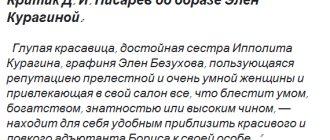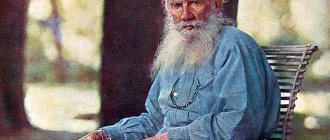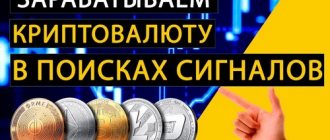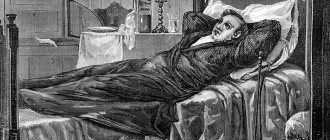War and Peace. Volume three (Tolstoy L.N., 1873)
XIV.
- Well, honey? No, brother, my pink beauty, and their name is Dunyasha... - But, looking at Rostov’s face, Ilyin fell silent. He saw that his hero and commander was in a completely different way of thinking.
Rostov looked back angrily at Ilyin and, without answering him, quickly walked towards the village.
“I’ll show them, I’ll give it to them, the robbers,” he said to himself.
Alpatych, at a swimming pace, so as not to run, barely caught up with Rostov at a trot.
-What decision did you decide to make? - he said, catching up with him. - Rostov stopped and, clenching his fists, suddenly moved menacingly towards Alpatych.
- Solution? What's the solution? Old bastard! - he shouted at him. -What were you watching? A? Men are rebelling, but you can’t cope? You yourself are a traitor. I know you, I’ll skin you all...” And, as if afraid to waste his reserve of ardor in vain, he left Alpatych and quickly walked forward. Alpatych, suppressing the feeling of insult, kept up with Rostov at a floating pace and continued to communicate his thoughts to him. He said that the men were stubborn, that at the moment it was unwise to resist
They, not having a military command, wouldn’t it be better to send for a command first.
“I’ll give them a military command... I’ll fight them,” Nikolai said senselessly, suffocating from unreasonable, animal anger and the need to vent this anger. Not realizing what he would do, unconsciously, with a quick, decisive step, he moved towards the crowd, and the closer he moved to it, the more Alpatych felt that his unreasonable act could produce good results. The men of the crowd felt the same, looking at his fast and firm gait and decisive, frowning face.
After the hussars entered the village and Rostov went to the princess, there was confusion and discord in the crowd. Some men began to say that these newcomers were Russians, and how they would not be offended by the fact that they did not let the young lady out. Drone was of the same opinion; but as soon as he expressed it, Karp and other men attacked the former headman.
- How many years have you been eating the world? - Karp shouted at him. - It’s all the same to you! You dig up the little jar, take it away, do you want to destroy our houses, or not?
“It’s been said that there should be order, don’t leave anyone’s house, don’t take out any blue gunpowder,” she said and that’s it! - shouted another.
“There was a line for your son, and you probably regretted your hunger,” the little old man suddenly spoke quickly, attacking Dron, “and you shaved my Vanka.” Oh, we're going to die!
- We're going to die!
“I am not a refuser from the world,” said Dron.
- He’s not a refusenik, he’s grown a belly!..
Two long men had their say. As soon as Rostov, accompanied by Ilyin, Lavrushka and Alpatych, approached the crowd, Karp, putting his fingers behind his sash, slightly smiling, came forward. The drone opposite entered the back rows, and the crowd moved closer together.
- Hey! Who is your headman here? - Rostov shouted, quickly approaching the crowd.
- Headman? What do you need ?..
- asked Karp.
But before he could finish speaking, his hat flew off and his head snapped to the side from a strong blow.
- Hats off, traitors! - Rostov’s full-blooded voice shouted. -Where is the headman? - he shouted in a frantic voice.
“The headman, the headman is calling... Dron Zakharych, you,” hurried, submissive voices were heard here and there, and hats began to be taken off their heads.
“We can’t rebel, we keep order,” said Karp, and several voices from behind at the same moment suddenly spoke:
- As the old people decided, there are a lot of you bosses...
- Talk?.. Riot!.. Robbers! Traitors! - Rostov screamed senselessly, in a voice not his own, grabbing Karp by the collar. - Knit him, knit him! - he shouted, although there was no one to knit him except Lavrushka and Alpatych.
Lavrushka, however, ran up to Karp and grabbed his hands from behind.
“Will you order our people to call from under the mountain?” - he shouted.
Alpatych turned to the men, calling two of them by name to mate Karp. The men obediently emerged from the crowd and began to loosen their belts.
- Where is the headman? - Rostov shouted.
The drone, with a frowning and pale face, emerged from the crowd.
-Are you the headman? Knit, Lavrushka,” Rostov shouted, as if this order could not meet with obstacles. And indeed, two more men began to tie Dron, who, as if helping them, took off his sash and handed it to them.
“You all listen to me,” Rostov turned to the men: “Now march home, and so that I don’t hear your voice.”
- Well, we didn’t do any harm. That means we are just being stupid. They just made nonsense... I told you there was trouble,” voices were heard reproaching each other.
“I told you so,” said Alpatych, coming into his own. - Not good, guys!
“Our stupidity, Yakov Alpatych,” answered the voices, and the crowd immediately began to disperse and scatter throughout the village.
The two tied men were taken to the manor's courtyard. Two drunk men followed them.
- Oh, I’ll look at you! - said one of them, turning to Karp.
“Is it possible to talk to gentlemen like that?” What did you think? Fool,” confirmed the other, “really a fool!”
Two hours later the carts stood in the courtyard of Bogucharov’s house. The men were briskly carrying out and placing the master's things on the carts, and Dron, at the request of Princess Marya, was released from the locker where he had been locked, standing in the courtyard, giving orders to the men.
“Don’t put it in such a bad way,” said one of the men, a tall man with a round, smiling face, taking the box from the maid’s hands. “She’s also worth money.” Why do you throw it like that or under a rope - and it will rub itself. I don't like it that way. And so that everything is fair, according to the law. Just like that, under the matting and covering it with hay, that’s what’s important.
“Look for books, books,” said another man who was taking out Prince Andrei’s library cabinets. - Don't cling! It's heavy, guys, the books are great!
- Yes, they wrote, they didn’t walk! - The tall, round-faced man said with a significant wink, pointing to the lexicons lying on top.
—————
Rostov, not wanting to impose his acquaintance on the princess, did not go to her, but remained in the village, waiting for her to leave. Having waited for Princess Marya's carriages to leave the house, Rostov sat on horseback and accompanied her on horseback to the path occupied by our troops, twelve miles from Bogucharov. In Yankov, at the inn, he said goodbye to her respectfully, allowing himself to kiss her hand for the first time.
“Aren’t you ashamed,” he answered Princess Marya, blushing, to the expression of gratitude for her salvation (as she called his action), “every police officer would have done the same.” If only we had to fight with the peasants, we would not have allowed the enemy so far away,” he said, ashamed of something and trying to change the conversation. “I’m only happy that I had the opportunity to meet you.” Farewell, princess, I wish you happiness and consolation, and I wish to meet you under happier conditions. If you don't want to make me blush, please don't thank me.
But the princess, if she did not thank him in more words, thanked him with the whole expression of her face, beaming with gratitude and tenderness. She could not believe him, that she had nothing to thank him for. On the contrary, what was certain for her was that if he had not existed, she would probably have died from both the rebels and the French; what he
For. in order to save her, he exposed himself to the most obvious and terrible dangers; and what was even more certain was that he was a man with a high and noble soul, who knew how to understand her situation and grief. His kind and honest eyes with tears appearing on them while she herself began to cry and talked to him about her loss did not leave her imagination.
When she said goodbye to him and was left alone, Princess Marya suddenly felt tears in her eyes, and here, not for the first time, she was presented with a strange question: does she love him?
On the way further to Moscow, despite the fact that the princess’s situation was not happy, Dunyasha, who was riding with her in the carriage, more than once noticed that the princess, leaning out of the carriage window, was smiling joyfully and sadly at something.
“Well, what if I fell in love with him?” thought Princess Marya.
Ashamed as she was to admit to herself that she was the first to love a man who, perhaps, would never love her, she consoled herself with the thought that no one would ever know this and that it would not be her fault if she remained without anyone for the rest of her life. speaking of loving the one she loved for the first and last time.
Sometimes she remembered his views, his participation, his words, but it seemed to her that happiness was not impossible. And then Dunyasha noticed that she was smilingly looking out the carriage window.
“And he had to come to Bogucharovo, and at that very moment!” thought Princess Marya. - “And his sister should have refused Prince Andrey!” And in all this, Princess Marya saw the will of Providence.
The impression made on Rostov by Princess Marya was very pleasant. When he remembered about her, he became cheerful, and when his comrades, having learned about his adventure in Bogucharovo, joked to him that, having gone for hay, he had picked up one of the richest brides in Russia, Rostov became angry. He was angry precisely because the thought of marrying a pleasant, meek Princess Marya with a huge fortune came to his mind more than once against his will. For himself personally, Nikolai could not wish for a better wife than Princess Marya: marrying her would make the countess - his mother - happy and would improve his father’s affairs; and even - Nikolai felt this - would have made Princess Marya happy.
But Sonya? And this word? And this is why Rostov got angry when they joked about Princess Bolkonskaya.
page 14
V. Shklovsky.
“WAR AND PEACE” by L. TOLSTOY.
(Formal sociological research)
CHAPTER 7-I.
BOGUCHAROVSKY RIOT.
This small piece of the novel deserves to have a separate chapter in the study, because here is the only place where the true heroes of Lev Nikolaevich - the nobles - come into contact with ordinary people. We are extremely accustomed to Lev Nikolaevich, and therefore, for example, our typical reader has no objection to Tolstoy’s language, to which Tolstoy’s contemporaries reacted so painfully. Tolstoy's heroes seem to us not only to be very believable heroes, but not even heroes, but living people. Meanwhile, such a disinterested witness as the Encyclopedia Britannica writes the following:
page 15
Leo Tolstoy.
“...There is something strained and abnormal in all the characters in “War and Peace”; but it must be borne in mind, that Tolstoy winged his shafts not at men generally, but at that particular section of society to which he himself by birth and association belonged.”
Encyclopaedia Britannica. Volume XXXIII. London. 1902 Page 369.
(...There is a lot of pretentious and abnormal in all the characters of "War and Peace", but we must take into account that Tolstoy aimed his arrows not at ordinary people, but at that special part of society to which he himself belonged by birth and connections... )
What is curious here is the awareness of the class character of Tolstoy’s heroes, which, obviously, has been lost by us due to our usual perception. The main construction of the Bogucharov revolt is that the Russian revolt is traditional, meaningless. For this purpose, the idealistic life of Bolkonsky’s peasants was given. This idealism was even stronger in the original versions of the novel:
[] 1. Cartoon from Iskra magazine.
“The men of both this village and all the other villages of the prince, without a feeling of special slavish respect and reverence, almost did not remember, and now the old people still do not remember the prince. He was strict, but merciful, as always, they say. The main thing that is felt in their praise (also, as always happens) is gratitude to the prince for the fact that the one whom they worshiped and worked for was a prince, a general-in-chief, a man completely different from them, who had never achieved anything to what detail, never equated to
page 16
him, proud and alien to them. No matter how much I did not want to upset the reader with a description that was unusual for him, no matter how much I did not want to describe the opposite of all the descriptions of that time, I must warn that Prince Bolkonsky was not a villain at all, he did not mark anyone, did not put his wife in the walls, did not eat for 4 -x, did not have seraglios, was not concerned only with defamation of people, hunting and debauchery, but on the contrary, he could not tolerate all this and was an intelligent, educated and such a decent man that, having brought him into the living room, now no one would be ashamed of him. ...The mill never stopped grinding new wine. The peasants of the Bald Mountains, no offense intended, on February 19th they worked cheerfully, on good horses and had an appearance of prosperity greater than what can now be found...”
Probably, the piece was thrown out because this idyll did not fit at all into the tradition of Russian literature of that time. In the same way, the old man Bolkonsky’s sending of his son from his serf mistress to an orphanage had a very poisonous parallel in an act similar to the behavior of Judushka Golovlev. The everyday fact already had a strong tradition of its perception, and Lev Nikolaevich tried, but did not dare to change it. For Tolstoy’s contemporary, the revolt of Bogucharov’s peasants was something extremely topical, as can be proven at least by the perception of Pyatkovsky, who defines the feat of Nikolai Rostov in this way:
“And this police outside the police, this former student and real hussar, who instantly turned into an enraged beast - really does not serve as a wonderful example of our native willfulness, which (especially 40 - 50 years ago) very naively considered itself a positive right? And why not count, when in every colored band of a cap - the dark people foresaw their superiors, with the power to punish and have mercy..."
“Week”, 1868 NN 22, 23 and 26. Article by A. P. Pyatkovsky entitled: “Historical era in the novel gr. L. N. Tolstoy.
The colored band is, of course, an allegory, it is a red noble band; and in Fet’s biographical records we find many such feats and a constant indication that the use of the law, and not the voluntary police, is meaningless and unnecessary. Lev Nikolaevich himself, they say, was a very conscientious peace mediator, but here he acts not as a mediator, but as an interested party. Historically, the setting of the princess’s departure is not correct. In reality, Russian landowners left Moscow because they were not very connected with Moscow.
page 16/1
[] 2. Work by A. M. Rodchenko. Decoration of the hunting hall in the film “Albidum”, dir. L. Obolensky, produced by MEZHRABPOM-RUS.
[] 3. Work by A. M. Rodchenko. Decoration of the stock exchange in the film “Albidum”, dir. L. Obolensky, produced by MEZHRABPOM-RUS.
page 16/2
[] 4. Work by A. M. Rodchenko. Decoration of a business office in the film “Albidum”, dir. L. Obolensky, produced by MEZHRABPOM-RUS.
[] 5. Work by A. M. Rodchenko. Decoration of the dance hall in the film “Albidum”, dir. L. Obolensky, produced by MEZHRABPOM-RUS.
page 17
Napoleon's mistake was that he considered Moscow a city like Vienna. Moscow was the winter residence of the nobles. When Napoleon attacked, the nobles, officials and the population serving them left. There were supplies in the city, but mainly from colonial goods. In Moscow there was sugar, tea, coffee and rice. There was little bread. The opportunity to go to the countryside created a “patriotic feat of the nobles.” Tolstoy transfers this mood to the village.
[] 6. Caricature from Iskra magazine.
" - Hurry up and go! Go quickly! - said Princess Marya, horrified by the thought that she could remain in the power of the French. “So that Prince Andrei knows that she is in the power of the French! So that she, the daughter of Prince Nikolai Andreevich Bolkonsky, asks Mr. General Rameau to provide her with patronage and enjoy his benefits!” This thought terrified her, made her shudder, blush and feel attacks of anger and pride that she had not yet experienced. Everything that was difficult and, most importantly, offensive in her position was vividly imagined to her. “They, the French, will settle in this house; Mr. General Rameau will occupy the office of Prince Andrei; for fun they will sort through and read his letters and
page 18
paper Mlle Bourienne lui fera les honneurs de Bogucharovo. They will give me a room out of mercy; soldiers will destroy their father's fresh grave to remove crosses and stars from him; they will tell me about victories over the Russians, they will feign sympathy for my grief...” thought Princess Marya not with her own thoughts, but feeling obligated to think for herself with the thoughts of her father and brother. For her personally, it didn’t matter where she stayed and no matter what happened to her; but at the same time she felt like a representative of her late father and Prince Andrei. She involuntarily thought with their thoughts and felt them with their feelings. Whatever they would say, whatever they would do now, that is what she felt necessary to do. She went to Prince Andrei’s office and, trying to penetrate his thoughts, thought about her situation.”
But the landowners did not leave the village so easily. Princess Marya is a Smolensk landowner. The nobleman Ushakov, in his story “The Brat of Ham,” quickly and justifiably admits the fact that Smolensk landowners often did not leave the villages.
“...The reader may want to object to me and assert that none of the Smolensk nobles remained in their estates and no one received uninvited guests? — Answer: I myself had the honor of serving in this memorable campaign and I boldly say that many remained. “Perhaps timid, low souls!” “Ttimid, low souls??? Ah, Mr. Reader! And Engelhard?.. Please bow respectfully before this name!.. I could name others no less worthy of respect, but this does not belong to my story. I’m talking about Nikita Vyazmin!.. I continue.”
V. A. Ushakov. "Bad brat." One Hundred Russian Writers. Ed. A. Smirdina. St. Petersburg 1845. Page 556.
What is this feat of Engelhard with which Ushakov is defending himself? I will give a description of this feat from a book equipped with a special engraving depicting the execution of Engelhard.
“...Known for the spirit of true nobility and firmness, the Smolensk nobleman Engelhard was not horrified by the invasion of enemies. Sympathizing with the misfortunes of his homeland and wishing with his presence to alleviate the sad fate of his fellow citizens, he remained on his estate in Dukhovsky district. Hand on heart, looking at Heaven, he made this vow to Heaven: among numerous enemies, to act against them; surrounded by foreign power, he decided to root in the hearts of the people love for the legitimate Sovereign and on the ashes of his fatherland to raise the banner of people's freedom and happiness.
page 19
“My deeds, conscience, the Emperor and God will justify my stay here!” he said, and began to fulfill his sacred vow. Some of his peasants, dissatisfied with the structure in which he kept them during the entire period of general disorder, indignant at the exemplary severity with which he punished them for participation in the robbery of the French and for disobedience against Russian laws - these peasants, satiated with flattering promises of freedom and golden sources , decided to go to Smolensk to the French authorities to report on their landowner about the deprivation of the lives of several Frenchmen. The peasants' request was heard by the judges, an investigation was carried out, and no traces of murder were found. The leader of the bandit gang himself would have been ashamed to pronounce a decisive verdict on Engelhard. Business continued as before on the estates of this latter; but the spirit of malice did not sleep: soon the rebels, incited by Napoleonic proclamations, united in a small band of robbers, collected several killed Frenchmen in the surrounding area, and, throwing them in the absence of the landowner under the floors of his house, brought French commissars from Smolensk to open the floors and testify to the dead bodies . Engelhard was found guilty of murder and summoned to the Supreme Court in Smolensk. ...It’s nice for me to dream about reviving the Russian codr in a monument! Let the Nobility of Smolensk and the whole of Russia, united by unanimous donations, build this monument to the one who died so gloriously for the rights and honor of the nobles; let them put it on one of the Smolensk squares in memory of our sons and great-grandsons! Let them inscribe it on one side: Russian Codru; on the other: Engelhard - Russian Nobility."
“Marching Notes of a Russian Officer”, published by I. Lazhechnikov. Moscow. 1836. Page 36 - 39.
As you can see, even in this extremely biased presentation, Engelhard is not shot for his feat against the French. He dies a victim of the peasants' ill will. The memoirist claims that Engelhard did not kill the French. The monument to Engelhard in the Smolensk moat was erected by nobles to a nobleman, and not by Russians to a Russian. Thus, the very fact of Maria Bolkonskaya’s departure from the village is not typical. In the same way, it must be said that the act of the Rostovs, who gave up their carts for the wounded, is far from a typical phenomenon and was taken by Lev Nikolaevich from the biography of Vorontsov.
“... Upon arrival at his house, on the German settlement, in Moscow, he found there a large number of carts sent from his villages, and sat down. Andreevsky, Vladimir province, to bring paintings, libraries and various kinds of jewelry there,
page 20
in the abundance contained in the house of his ancestors, he ordered all this to be left as booty for the enemy and to use the carts to raise the wounded soldiers, who could not all, due to their huge number, receive the necessary help ... "
Shcherbinin, Biography of Vorontsov, p. 65.
It is interesting to note that this is the only borrowing made by Tolstoy from a very large book, and the act of Vorontsov, a super-millionaire, is transferred to the Rostovs, who sacrifice almost the last. It should be noted here, by the way, that the nobility actually lost a lot of property in Moscow and therefore had a negative attitude towards Rostopchin. Those literary historians and historians simply who consider Leo Nikolayevich Tolstoy’s peculiar depiction of the character of Rostov a definite historical discovery are wrong, because here we have a typical noble attitude, which can be proven at least by the testimony of Vyazemsky:
“In any case, there is no doubt that the scoundrel Moscow was pleased with the dismissal of Rostopchin. When he returned to Moscow, liberated from the enemy, and when those who had left it little by little began to arrive, public opinion turned out to be hostile to Rostopchin... ...The owners of the burnt houses began to regret them and think that, perhaps, it was not necessary burn them. They said that one of the reasons that destroyed Napoleon was that he lived too long in Moscow. The fire of Moscow could frighten him and force him to follow on the heels of our retreating army, which could hardly resist his pursuit. Be that as it may, the discord between Rostopchin and Moscow reaches its highest degree. ...At a celebration given in Moscow in the house of Poltoratsky after the entry of our troops into Paris, this ill will towards Rostopchin appeared in the following case. When the assembled guests were invited to go into the hall where the dramatic performance was to take place, Prince Yuri Vladimirovich Dolgorukov hastened to shake hands with Margarita Alexandrovna Volkova and was the first to enter the hall with her. The entire audience followed him. Count Rastopchin was left alone in the empty room.”
P. A. Vyazemsky. Collection Op. St. Petersburg 1883. T. VIII, p. 79.
I will not quote Bogucharov’s rebellion, but I still must note first of all the first phenomenon: Lev Nikolaevich’s peasants are not divided and do not think. They are shown extremely conditionally. Initially, he had the character of Drone, but in the rework Lev Nikolaevich destroyed his characterization.
page 21
L.N. Tolstoy's alteration is characteristic in that it cannot be explained, for example, by abbreviation, since the texts are almost the same size. The alteration went along a different line. Let's compare the texts. Headman Dron had his own biography and character from Tolstoy:
“Dronushka 23 years ago, having already been a headman, suddenly began to drink, he was severely punished and was replaced from the headmen. Following this, Dronushka fled and disappeared for about a year, walked around monasteries and deserts, and was in Lavra and Solovetsky. Returning from there, he showed up. He was punished again and put under taxation. But he did not begin to work and immediately disappeared. A week later, exhausted and thin, barely dragging his feet, he came to his hut and lay down on the stove. Dron spent this week in a cave, which he himself dug in the mountain, in the forest, and which behind him he filled with stones smeared with clay. He spent six days, almost without food or drink, in this cave, wanting to escape, but on the seventh day the fear of death came over him, he dug himself out with difficulty and came home.”
This biography, as you can see, is individual. But it was thrown out of the proof by L.N. Tolstoy himself and replaced by another typical characteristic.
“For thirty years Bogucharov was ruled by the elder Dron, whom the old prince called Dronushka. Dron was one of those physically and morally strong men who, as soon as they get old, grow a beard, and so, without changing, live up to 60 - 70 years, without a single gray hair or missing tooth, just as straight and strong at 60 years old, as in 30. Dron, soon after moving to the warm rivers, in which he participated, like others, was made mayor-mayor in Bogucharovo and since then has served in this position flawlessly for 23 years.”
An individual Drone would destroy the princess scene, giving reality to the peasant side. The image of Platon Karataev is conventional, more conventional than the soldiers in the young Tolstoy. But they, as can be easily seen in his war stories, are composed of folklore and speak in parables and fairy tales. In addition, it is episodic: it is not in the original plan of the novel. This probably characterizes Tolstoy’s literary dependence more on Dahl’s “Soldiers’ Leisure” than on the soldiers themselves. Instead of these complex constructions, we see some two “long men”, completely conventional. The mood of Rostov attacking the peasants is given in images of war
page 22
and hunting. I will give two parallel moments: Rostov before the attack and Rostov before the crowd of peasants.
1) “Rostov looked at what was happening in front of him as if he were being persecuted. He instinctively felt that if he now attacked the French dragoons with the hussars, they would not be able to resist, but if he struck, it was necessary now, this very minute, otherwise it would be too late. He looked around him. The captain, standing next to him, did not take his eyes off the cavalry below in the same way. “Andrei Sevastyanich,” said Rostov, “after all, we will doubt them...” “It would be a dashing thing,” said the captain, “but really... 2) “I will give them a military command... I will fight them,” Nikolai said senselessly, choking from the unreasonable , animal anger and the need to pour out this anger. Without realizing what he would do, he unconsciously moved toward the crowd with quick, decisive steps. And the closer he moved to her, the more Alpatych felt that his unreasonable act could bring good results. The men of the crowd felt the same, looking at his fast and firm gait and decisive, frowning face.”
Nikolai Rostov in Tolstoy thus acts with “prudent fury,” and the entire episode represents the old version of the story about the Scythians who conquered their slaves, having decided to arm themselves with one crack of the whip. Tolstoy’s peasants don’t think anything at all, and their actions seem completely meaningless. They rebel the moment the princess offers them bread. What's the matter? The matter here is not at all meaningless and can be accurately dated. At this time, there were attempts not only to intensify the corvee system, but also attempts to remove the peasants from the land and turn them into people working only for bread, that is, to completely destroy the peasant economy and turn the corvee system into a system of latifundia. This is how Professor Jacob conveys this system in the Proceedings of the Free Economic Society, and Professor Jacob is one of the supporters of free-hired labor.
“...In the same way, some gentlemen force their peasants to work for food alone; however, this can only happen on small estates, or on small parts of large estates, and for that it hardly deserves special attention. Although in this way the owners retain the wages that followed the free hired people, however, on the other hand, these forced workers think little about the working day, their work is so unsuccessful, bad,
page 23
is unprofitable and requires so much supervision that the harm caused exceeds the costs needed to hire free workers.”
Proceedings of the Free Economic Society to encourage agriculture and house-building in Russia. Part LXII. The answer to the problem of whether it is more profitable to cultivate the land with your own or with hired workers. G. Jacob. St. Petersburg 1814.
Only then can we understand the next scene.
“Many people are pleased with your favors, but we don’t have to shout the master’s bread,” said a voice from behind. “Why not,” said the princess.
……………
- Why agree, we don’t need bread. - Why should we give up everything? Do not agree. We disagree... We do not agree. We feel sorry for you, and we do not agree. Go on your own, alone...” was heard in the crowd from different directions. And again the same expression appeared on all the faces of this crowd, and now it was probably no longer an expression of curiosity and gratitude, but an expression of embittered determination. “You didn’t understand, right,” said Princess Marya with a sad smile. - Why don’t you want to go? I promise to house you and feed you. And here the enemy will ruin you... But her voice was drowned out by the voices of the crowd. “We don’t have our consent, let him ruin it!” We don’t take your bread, we don’t have our consent! Princess Marya again tried to catch someone's gaze from the crowd, but not a single glance was directed at her; the eyes obviously avoided her. She felt strange and awkward. - See, she taught me cleverly, follow her to the fortress! Ruin your houses, and go into bondage. How? I'll give you the bread, they say! - voices were heard in the crowd."
Let us note the statement of the peasants “only we don’t have to yell (plow) the master’s grain.” This is the resistance of the peasants against a certain new system of exploitation. Of course, Lev Nikolayevich Tolstoy, who was very interested in labor issues, could explain to the reader the behavior of the peasants, but then the revolt would not be completely meaningless and the question would be that only in this case the peasants were mistaken, and the relationship of forces in the passage and the role Rostov would change. Concealing his motivations, Lev Nikolaevich Tolstoy here acts completely logically, pursuing certain goals. This is a vivid example of how a certain technique, at the moment of its implementation, pursues goals that can be precisely defined. This technique is now perceived even outside of Tolstoy’s attitude. Konstantin Leontyev also noted:
page 24
[] 7. Caricature from Iskra magazine.
“Once I had to read “War and Peace” aloud to two very young, but intelligent and developed peasant husband and wife. I was embarrassed and ashamed in front of them in these places for the author and for the work that interested and delighted them both to the point that after finishing reading they were worried about the fate of Pierre as a living person. The young wife said: “Well, thank God that Pierre got settled; If only with his lack of character, he wouldn’t go bankrupt!” And the husband objected: “Well, no, now Natasha won’t let him go broke.” They both forgot about serfdom, even though they themselves were the children of serfs, Count Tolstoy was so able to make them fall in love with their nobles.”
That is, Tolstoy’s serf readers forgot about serfdom. The artistic form destroyed the semantic content. In modern perception, of course, the whole question of the month and even the question of Rostov’s behavior is unloaded. But for its time, “War and Peace” had a certain propaganda significance.
—————
The accompanying cartoons were published in Iskra magazine parallel to the appearance of the novel's chapters. We place them as an interesting indication of the nature of the perception of the novel by L. Tolstoy’s contemporaries.





